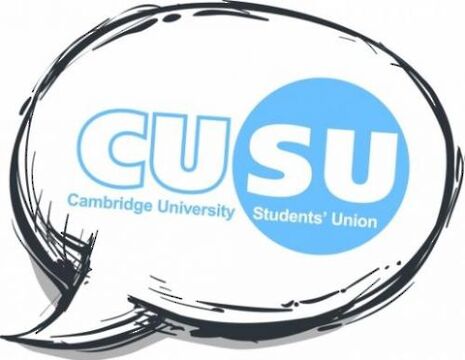CUSU: A heart in search of a body and a brain
CUSU means well, but you only need to go to a meeting to understand why the scepticism exists

Cambridge University Student Union, or CUSU as it is commonly known, often gets a bad rep. As largely self-appointed arbiters of student representation, its Executives and Officers are sometimes regarded as being out-of-touch with the majority of students. If you explain to the typical Cantab what their student union does, you’ll be met with the blank stare normally reserved for when a Mathmo explains their PhD topic. Student activism is alive and well in Cambridge, but often it feels as though CUSU and the Graduate Union (GU) are a couple of steps behind. Some argue that it can be hard for CUSU to justify the money it gets from college JCRs and MCRs, especially when, in the Welfare Officer’s fortnightly update, highlights include researching “the possibility of getting a GU kitten”.
Given that anyone can attend, and freshers receive an email inviting them every week, CUSU Council attendance can be a little underwhelming. The meetings, which take place in the airtight student union common room, typically only attract people who were voted in by their colleges – at Monday’s meeting, it seems a fellow reporter and I were the only two who could truly say we were there voluntarily. The room gets extraordinarily warm – if any students are seeking a free sauna experience, they could do worse than heading over to CUSU in swimming trunks. The soporific atmosphere isn’t helped by a voting procedure that, in an attempt to let all voices be heard, traps debate in a quagmire of speeches, questions, amendments and votes.
The debate on Monday centred around votes to oppose the publication of the Tompkins Table (a yearly ranking of colleges by grade that is produced independently of the university) and to campaign against the publication of class lists. We’re told that the Tompkins Table suggests that students from women’s and mature colleges are less successful, and that, of course, all Cambridge students are equally successful. It’s a beautiful sentiment, but seems to broadly ignore the idea that objective facts have any value – if some people want to know which college gets the most Firsts, for example, why shouldn’t that information be publicly available? And spare a thought for poor Mr Tompkins (of table-creating fame) – what will become of him?
The ying of cuddly do-goodery makes up the greater part of the council attendance – the Officers and Executives speak frequently, and present the majority of motions (though the sabbs, with the exception of the Women’s Officer, do not have a vote). They command a bloc: in general, most of the attendees vote with the prevailing wind, which tends to be CUSU’s inner core. The majority of these voters – sent from their colleges’ JCRs and MCRs to represent their fellow students – never speak.
All is not unified, however. One group sits in the corner and frequently asks questions about process and due diligence, or checks up on whether previous motions have been followed through properly. Take, for example, the recent petition to stop the County Council from turning out the lights on a few student-frequented streets in central Cambridge from April next year. After a lengthy debate in October, CUSU council vowed to support the existing petition, but also to create their own independent one, widening the number of roads mentioned. At the meeting last Monday, the Executives weren’t able to give any information about whether the new petition had been created – even though it appears to exist (with around 400 signatures to the original petition’s 2,300).
The heart of this yang group is the bad cop/bad cop pairing of Trinity JCR President Cornelius Roemer, and Fitzwilliam JCR Vice President Damiano Sogaro. Sogaro and Roemer ask questions throughout, seeking clarification, checks and balances. As we go through the motions (literally), they often seem more like pantomime villains – sighs can be heard as their hands go up and as they make small, often pedantic changes to the wording of motions. The majority of attendees, wearisome from hours of debate, seem appalled that these people might want to do something as selfish as to represent their own JCRs. When the time comes to vote, the resolute “No”s come from this corner. But they don’t stand a chance.
There’s a persistent question raised at CUSU council: how do we get students involved, and to care about what we say? There’s no easy answer. Those people who attend must find its procedural form off-putting, and those in attendance who attempt to actually represent their colleges suffer death by a thousand bureaucratic cuts. It’s clear that CUSU’s inner core means well, even if they occasionally disregard the democratic mandate they claim to have – at the second council of term, they voted to support the Campaign for Free Education, but after some debate decided not to adopt a part of the slogan that read “Tax the rich”. Cue, last week, a photo emerging of CUSU’s Coordinator holding a placard bearing those exact words. There’s a beating heart in CUSU, but right now it’s a heart without a student body, and somewhat short on brains.
 Comment / Anti-trans societies won’t make women safer14 November 2025
Comment / Anti-trans societies won’t make women safer14 November 2025 News / Controversial women’s society receives over £13,000 in donations14 November 2025
News / Controversial women’s society receives over £13,000 in donations14 November 2025 News / John’s rakes in £110k in movie moolah14 November 2025
News / John’s rakes in £110k in movie moolah14 November 2025 Comment / Be mindful of non-students in your societies12 November 2025
Comment / Be mindful of non-students in your societies12 November 2025 News / Home Office denied PhD student visa to attend graduation14 November 2025
News / Home Office denied PhD student visa to attend graduation14 November 2025










